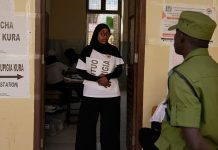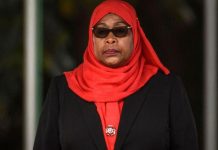Author: SYLIVESTER DOMASA
AfricaPress-Tanzania: PRESIDENT John Magufuli’s administration has reaffirmed commitment to empower youth in the country, vowing to support their involvement in economic production and national development.
Anthony Mavunde, the Deputy Minister of State in the Prime Minister’s Office, Policy, Parliamentary Affairs, Labour, Employment, Youth and the Disabled, said at the climax of this year’s International Youth Day (IYD) that the young generation is the key to the country’s development.
The ‘State of World Population 2020’ shows that the youth population is 1.8 billion, being 24 per cent of world population of 7.5 billion people. According to the National Bureau of Statistics (NBS), the youth population will reach 34.5 million by 2035.
Mr Mavunde pointed out that the International Labour Organization (ILO)’s projection was that the global workforce in 2020, was 41.2 per cent while in Tanzania 56 per cent of the national workforce comprised the youth.
He said the youth also form part of an important decision making group, urging them to fully take part in the forthcoming general elections.
“We have to acknowledge the importance of youth participation in the election and empower them fully to exercise their constitutional right,” he said, calling on young people to be given the mandate to participate to do so peacefully.
This year’s IYD, according to the United Nations (UN), seeks to highlight the ways in which the engagement of young people at the local, national and global levels is enriching national and multilateral institutions and processes, as well as drawing lessons on how their representation and engagement in formal institutional politics can be significantly enhanced.
According to the deputy minister, youth participation in this year’s general election is an indication that they are no longer left behind in seeking elective positions.
Mr Mavunde said among those who sought nomination in different political parties to vie for various positions in the 2020 election, at least 90 per cent of them are youth.
According to the youthful minister, many young people in the country have been attracted by President John Magufuli’s leadership which has seen many youth appointed to leadership positions.
“The massive turnout to seek political positions by the youth is a clear indication that the fifth phase government’s way of dealing with young people has attracted them very much and they have hope in the president,” he added.
The deputy minister also stated that the government has been doing a lot to empower youth in the country, saying some of the strategies for achieving the mission included the disbursement of 1bn/- annually to the National Youth Empowerment Fund under the Prime Minister’s Office where youth get interest free loans.
He said to date, a 3.2 bn/- has been disbursed to some 586 groups with a total of 4,222 members in 155 district councils throughout the country.
Another way of empowering the young people is through allocation of the four per cent of own source revenue by district councils.
He also noted that all district councils in the country had been directed to set aside youth economic zones and put in place the essential infrastructure to enable the youth operate from there.
He cited other government efforts to empower youth as including tuition free education for primary and secondary school students, and increased budget for higher students’ loans from 367.35 bn/- in 2015 to 450 bn/- in 2020.
Others include the apprenticeship programme whereby some 28,941 have benefited, being 56 per cent of all the beneficiaries.
Through the same programme, according to the deputy minister, some 20,432 youth have been recognized under the Recognition of Prior Learning (RPL) system.
It is along the same lines that some 5,975 graduates from higher learning institutions in the country got internship in different private and public institutions.
On the other hand, a total of 8,980 people from 12 regions embracing 84 district councils were trained in green house technology in the first phase. The second phase will see 18,700 others given training on the field.







